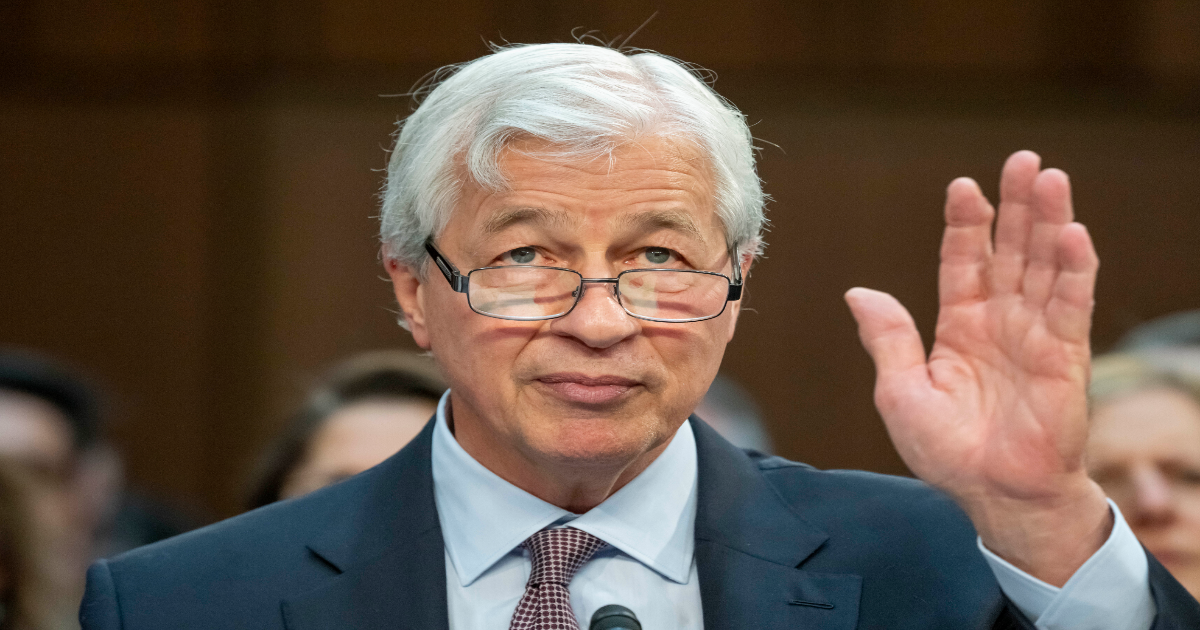Wall Street’s rule of thumb for President Donald Trump had been that he would curb his aggressive trade policies if markets tanked or the economy began to falter. No more.
With U.S. financial markets poised for another potential selloff and Trump remaining defiant about his sweeping tariffs, JPMorgan Chase CEO Jamie Dimon on Monday cautioned investors that the trade wars could threaten economic alliances that have made the U.S. the world’s most powerful country. Goldman Sachs Chief Economist Jan Hatzius bumped up the odds of a U.S. recession to 45 percent. And even Bill Ackman — the hedge fund billionaire and one of Trump’s biggest Wall Street cheerleaders — warned that the president’s ability to navigate the trade battle will be weakened if markets continue to crater.
“It does not help our country’s and our president’s negotiating position to be trying to strike deals while our market is collapsing,” Ackman posted on X on Sunday night as futures markets cratered. “Whoever is recommending that idea to President @realDonaldTrump should be fired right now.”
The stock market crash that erased trillions of dollars from Wall Street balance sheets, retirement accounts and public pensions last week looks likely to continue this morning as investors reckon with a White House that’s hell-bent on upending the global economy in the name of fairness. Asia stocks tumbled overnight.
The S&P 500, which had surged following Trump’s election, is expected to open down more than 20 percent from the record high it notched just six weeks ago. The tech-focused Nasdaq and Dow Jones Industrial Average are also in danger of massive losses, and — unlike in normal market slides — investors are also dumping typical safe assets like the U.S. dollar and gold.
“I’ve been around a number of times when events led everybody to focus on how circuit breakers work,” former Treasury Secretary Larry Summers said in an interview, referring to procedures that halt the trading of stocks when losses become too severe. “Never has the event in question been the action of the president of the United States.”
As stock market futures sank on Sunday night, Trump told reporters on Air Force One that he doesn’t “want anything to go down, but sometimes you have to take medicine to fix something.”
“What’s going to happen to the markets, I can’t tell you. But our country is much stronger,” he added. Trump says U.S. trading partners, many of whom run surpluses, are treating American companies unfairly through tariff and non-tariff barriers. He also wants to pressure more companies to make their products in the U.S.
Trump’s tariff war has been a brutal wake-up call for Wall Street traders who had assumed the president would defer to market forces on policy matters. He never hid his plans to impose universal tariffs on major trading partners, but most investors had discounted the likelihood of a full-blown trade war, focusing instead on whatever economic stimulus could come from deregulation, lower energy costs and tax cuts.
Instead, they’re now grappling with a tariff regime that puts not only their bottom lines at risk but the world economic order.
Dimon on Monday told investors that his most serious concern about Trump’s tariffs “is how this will affect America’s long-term economic alliances.” The administration’s protectionist trade agenda could result in retaliation and weaken confidence in the U.S. economy, its markets and the dollar, he said in his letter to shareholders.
“The quicker this issue is resolved, the better because some of the negative effects increase cumulatively over time and would be hard to reverse,” Dimon added. “I am hoping that after negotiations, the long-term effect will have some positive benefits for the United States.”
Stanley Druckenmiller, the former hedge fund executive and colleague of Treasury Secretary Scott Bessent, on Sunday said he opposed any tariffs exceeding 10 percent. And Clifford Asness, a longtime GOP donor and the chief of AQR Capital Management, decried the policies’ Republican defenders as “feckless toadies willing to say the most ignorant things to please their dear leader.”
It’s unclear how quickly negotiations with foreign governments can yield results that might alter Wall Street’s outlook. While administration officials said that as many as 50 countries have reached out to seek new trade deals before tariffs take effect April 9, Bessent and Commerce Secretary Howard Lutnick suggested in separate television appearances that those negotiations could take time.
“It’s not the kind of thing you can negotiate away in days or weeks,” Bessent said on NBC’s “Meet the Press.”
The longer it takes, the greater the likelihood of a recession. In an investor note, Hatzius noted that the “sharp” tightening of financial conditions — along with foreign boycotts of U.S. goods and retaliation from other governments — could add to the effects of the trade war.
“If the White House does implement most or all of the April 9 tariffs, the effective tariff rate” will climb by about 20 percentage points, Hatzius wrote. Goldman — along with most banks — has warned that higher tariff rates will result in lower growth and higher inflation.
If Trump pulls the trigger April 9, “we expect to change our baseline to forecast a US recession,” Hatzius wrote.
